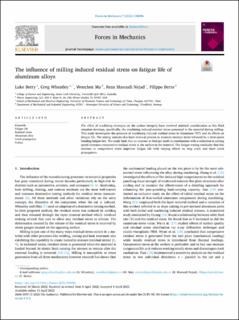The influence of milling induced residual stress on fatigue life of aluminum alloys
Peer reviewed, Journal article
Published version
Date
2022Metadata
Show full item recordCollections
Original version
10.1016/j.finmec.2022.100096Abstract
The effect of machining strategies on the surface integrity have received minimal consideration as this fluid situation develops, specifically, the machining induced residual stress generated in the material during milling. This study investigates the presence of machining induced residual stress in Aluminum 7075 and its effects on fatigue life. The testing consists of a layer removal process to measure residual stress followed by a three-point bending fatigue test. The study finds that an increase in feed per tooth in combination with a reduction in cutting speed increases compressive residual stress at the surface in the material. The fatigue testing concludes that this increase in compressive stress improves fatigue life with varying effects on long crack and short crack propagation.

